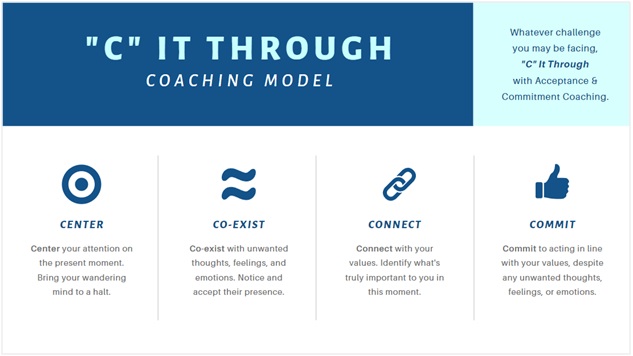A Coaching Model By Meaghan Sullivan, Performance Coach, UNITED STATES
“C” It Through Preaches That We Need to “Feel Good” and “Think Positively”
As a performance coach, I support clients who face performance-related obstacles. When we think of performance, we might think only of athletic or theatrical performance. However, performance happens in all aspects of life, such as public speaking, job interviewing, and interpersonal relationships. Performance issues often arise due to mental or emotional roadblocks, such as fear of failure or embarrassment, self-doubt, stress, anxiety, or lack of motivation, among many others. When these internal hurdles arise, it can be difficult to see a way forward, and we may feel overwhelmed or discouraged by our intrusive thoughts and emotions. If given too much credence, however, these internal experiences can prevent us from taking productive or meaningful action, leaving us feeling stuck and unsure of how to proceed. In other words, performance stalls.
Unfortunately, society often preaches that we need to “feel good” and “think positively” before we can take productive action. However, this is an unrealistic and uncontrollable expectation that forces us to remain passive, waiting for our emotional and cognitive stars to align before we can move forward. Instead of trying to overcome obstacles by either waiting around or manufacturing “good” or “positive” thoughts and emotions that may feel disingenuous, we can instead learn to embrace each challenge for what it is, and “C” it through.
“C” It Through Coaching Model
“C” It Through is my four-step coaching model inspired by the principles of acceptance and commitment coaching (ACC; Hill & Oliver, 2019). ACC, which stems from acceptance and commitment therapy (ACT; Hayes et al., 2006), proposes that becoming mindfully aware of our thoughts and emotions, without judgment, enables us to observe and accept their presence. With this acceptance, we can learn to co-exist with unwanted or unhelpful thoughts and emotions without the need to change, avoid, or eliminate them. Instead, we can choose to connect to our values, or what is most important to us, and then commit to acting in line with those values, regardless of the thoughts or emotions we may be experiencing.

-
Center
The first step to “C” it through is to center our minds and anchor our attention to the present moment. Intrusive thoughts and emotions can swiftly pull our attention into the past (e.g., “I can’t believe I did that.”) or into the future (e.g., “What will others think of me?”), which results in our losing touch with reality. Centering our minds enables us to take a mindful pause, which helps us to assess our current situation more clearly and objectively. Finding and focusing on our breath or describing the characteristics of an object in our physical environment are two examples of how we can quickly center our attention.
-
Co-Exist
By pulling our attention back to the present moment, we have now created distance between ourselves and the thoughts and emotions that gripped us just a moment before. Having made this separation, we can begin to observe our thoughts and emotions, rather than remain entangled in them. When we observe or notice (rather than attach or buy into) our thoughts and feelings, we come to view them as byproducts of a busy mind. In other words, we recognize that our minds will generate thoughts and emotions at random and without our permission. The more often we observe our minds’ behavior, the sooner we realize that its unpredictability is completely normal. With this realization, we can release our judgment of or desire to change our thoughts and feelings and, instead, learn to co-exist with them. We may not choose what comes to mind, but we always choose and control how we respond to it.
-
Connect
When we have learned to accept the presence of and co-exist with unwanted thoughts or feelings, we free ourselves to connect with what matters. Our thoughts and emotions may seem important or meaningful, but they only have meaning if we choose to give them meaning. Rather than relinquishing our power to our thoughts and feelings, why not give that power to our values? Connecting is about reminding ourselves of what truly matters to us and the values we aspire to uphold. As compared to our transient thoughts and emotions, our values are extremely stable. In this way, our values serve as our anchor amidst an emotional storm. Therefore, if we connect with our values, especially in turbulent times, we are far more likely to act in a way that moves us closer to what matters.
-
Commit
After we center our minds, co-exist with intrusive thoughts and feelings, and connect with our values, we are ready to commit to taking action that aligns with our values. Committing is all about behaviors because our actions are what we ultimately control. To commit is to embrace our unwanted or uncomfortable thoughts and feelings and choose to pursue our values anyway. Thoughts and feelings are free to come and go as they please because we understand that our true power lies not in controlling them but in controlling our response to them, and we demonstrate our control through our commitment to values-based actions.
Learn How to Create Your Own Coaching Model
Your Coaching Model reflects your values,
philosophies and beliefs and must communicate who you will coach
and the problems you will solve. Read more about creating your coaching model
References
Gardner, F. L., & Moore, Z. E. A mindfulness-acceptance-commitment-based approach to athletic performance enhancement: Theoretical considerations. Behavior Therapy
Hayes, S. C., Luoma, J. B., Bond, F. W., Masuda, A., & Lillis, J. Acceptance and commitment therapy: Model, processes, and outcomes. Psychology Faculty Publications
Hill, J. & Oliver, J. Acceptance and commitment coaching: Distinctive features. Routledge.
